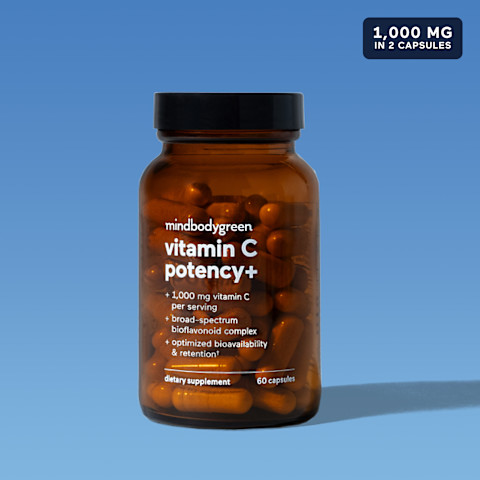Do Vitamin C Supplements Make You Feel Queasy? Here's Why & What To Do

It's an unfortunate truth: Some vitamins can make you feel a bit, well, uneasy. (If you've ever popped a multi first thing in the morning on an empty stomach, you know exactly what I'm talking about.) Because these nutrients are so concentrated, you may experience some stomach upset as your empty digestive system tries to process them. Perhaps the most common culprits are less gentle forms of iron and zinc—but did you know vitamin C can also cause some discomfort?
Yes, the beloved old-school vitamin can make some people feel queasy. However, there's an easy fix—if you've ever felt not-so-hot after tossing back a vitamin C supplement, you might be choosing the wrong formula. Here's how to select a supplement that's gentle on your gut.
Why some vitamin C supplements can make you feel queasy.
Short answer? "It could be because you took plain ascorbic acid at such a high dose," says mbg's vice president of scientific affairs Ashley Jordan Ferira, Ph.D., RDN, on the mindbodygreen podcast. Now, there are many benefits to taking higher-dose vitamin C: While the recommended intake for vitamin C is currently set at 75 milligrams per day for adult women and 90 milligrams daily for adult men (your baseline needs, mind you), research shows that higher intakes (i.e., 200 to 1,000 milligrams or more each day) may provide better overall health outcomes, especially in regards to immune function and response1 and cardiovascular health2 (see here for a full breakdown of the research).*
So we highly recommend you take a higher-dose vitamin C supplement to fully leverage all of its health benefits, but check your labels: If your supplement only has ascorbic acid, you might run into stomach discomfort. See, your gut is well equipped to utilize plain ascorbic acid (by itself) in lower doses (like, 500 milligrams or less). "In the higher potency plays, 500 milligrams plus, you're going to end up excreting quite a bit," says Ferira. "It's just not going to be well utilized," as the gut isn't set up for that—and that's why you may face some queasiness.
That said, you want to find a vitamin C supplement that not only prioritizes bioavailability (absorption rate) but also a gentle absorption experience in the gut. For example, mbg's vitamin C potency+ contains a potent 1,000 milligrams of vitamin C, along with a rice bran lipid "helper," if you will, to help usher that vitamin C into the gut and your cells throughout your body.* "The lipid is literally helping chauffeur vitamin C—this water-soluble thing—to make it more agile in the gut for absorption and more agile at the cell,"* says Ferira. Remember: Every cell in your body has a lipid component (aka the cell membrane). "So it's helping deliver it there for cellular absorption and retention superiority,"* adds Ferira.
Not to mention, this potent formula features an array of bioflavonoids from 100% whole citrus fruits (like lemon, Key lime, grapefruit, sweet orange, and mandarin orange) to buffer vitamin C from oxidation—that way, the essential vitamin can deliver on its whole-body antioxidant and anti-inflammatory actions.* So if you've experienced queasiness from vitamin C supplements in the past, "you might want to try this as a new experience," Ferira adds. "That won't be the case when we've enrobed our vitamin C with lipids and citrus bioflavonoids. It has a gentleness."*
The takeaway.
Some vitamin C supplements can cause an upset stomach. However, all you need to do is find a high-quality formula that calls on bioactive lipids and bioflavonoids to help usher and buffer vitamin C in the gut (ahem, like ours).* While bioavailability and dosage are both important to keep in mind, it's a lot easier to stick to the supplement routine if said supplement is easier on your stomach.

